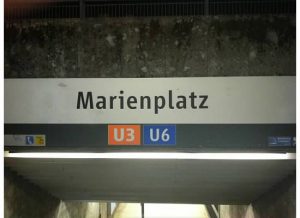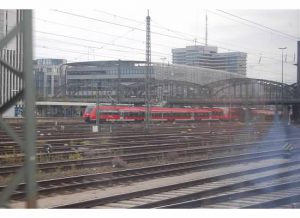All Aboard the Open Access Train

My husband and I recently traveled to Munich, Germany on our honeymoon. We didn’t have a car, but Munich’s U-bahn (Untergrundbahn, underground rail) and S-bahn (Stadtschnellbahn, commuter rail) allowed us to travel all over the city as well as to and from the airport. Both rail systems were easy to navigate, safe, clean, and even – for us suburbanites who drive more than 150 miles each per week around Atlanta – fun to ride. Someone else did the driving for once!
What really amazed us about Munich’s rail, however, was the ticketing system. Here’s how you ride the trains in Munich: Go to station. Purchase ticket from kiosk or ticket counter. Time-stamp ticket. Walk to train platform. Ride train.
Wait. Where were the turnstiles? Or the attendant punching tickets?
- Smart associations are learning to participate in—rather than fight against—today’s sharing economy.
- Like the European transit system, more and more associations are providing free or low-cost access that encourages repeat visits and usage.
- Associations can widen their reach and expand their potential membership pool by taking down barriers to some of their high value resources and education materials.

Nowhere. The Münchner Verkehrs-und Tarifverbund (the municipally-owned Munich Transport and Tariff Association, MVV) and the citizens of Munich operate on an honor system. MVV provides a quality, useful service, and citizens voluntarily purchase tickets to support this service. (Though there are inspectors who occasionally check passengers’ tickets and impose a €40 if you do not have a valid ticket, we did not see any during our stay.)
Wide-eyed after breezing onto the platform for our first Munich U-bahn ride, my husband and I looked at each other and agreed that, unfortunately, an American transportation authority that allowed open-access ridership would be broke within six months.
But could an open-access honor system work for associations and their resources?
Many associations have repositories of books, videos, and other multimedia that educate members about their industry or their members’ profession. Many post these materials on their websites for easy, anywhere access. The Canadian Association of Oilwell Drilling Contractors and the Louisiana Oil & Gas Association both offer weekly, often daily updates about rig counts, legislative happenings and wages – comprehensive compendia of information that is essential to the daily operations of oil industry professionals, and accessible to everyone, whether or not they are CAODC or LOGA members.
Some, like the California Society of Association Executives, offer online discussion boards and member communities that facilitate the exchange of information. You must be a member to join the discussions and access the member-created online topic-based libraries, but membership includes access to everything online.

You could argue that one purpose of associations is to collect and make accessible information that will further individuals’ careers as well as an industry as a whole. The Melos Institute’s description of membership-based organizations (MBOs) states that “MBOs are actively engaged in defining the body of knowledge necessary to advance the discipline” and that “MBOs are dedicated to advancing the competency of those involved in the discipline.” Thus, of course an association should operate on an open-access basis so that as many people as possible can enjoy the benefits of the association’s collective body of knowledge plus the work of its professionals, volunteers, community leaders, and mentors. There’s evidence that associations take this priority seriously: according to ASAE and the Center for Leadership, 92,331 trade and professional associations spent more than $2.6 million million on education and professional development activities in 2009.

Of course someone has to finance the time, effort, and materials that go into curating a library, a website or a study program., Just like someone has to pay to keep the U-bahn trains clean and the tracks in working order. It is the governing body’s responsibility to set a fair price. But if the product or service is one of quality, that conveniently and affordably serves a need, then people will be willing to support it monetarily. For its U-bahn network, the MVV offers single-person day tickets starting at 6 €. For less than double the cost – 11,20 € – you can buy a “partner ticket” that is valid for two to five adults. No, really: Two to five adults can ride the train for a flat price! Besides the community this scale of economy fosters (let’s ALL go to Oktoberfest together!), MVV encourages its riders to use its trains more by making it extremely affordable.
What might this model look like for associations? A declining scale of membership fees for people from the same company, neighborhood, or college? Decreased cost to access study materials based on frequency of meetings with a mentor? Associations should encourage use of its libraries and human networks in the same way the MVV encourage riders to ride the U-bahn.
It’s up to associations to set a fair price for their resources. But if their purpose is to advance their discipline, cause or industry as a whole, then relatively open, affordable access ensures that no one is completely left out or left behind. Everyone, even if they are currently struggling, should enjoy the benefits of a well-founded network.
Conclusion
We paid for our train tickets, of course, because we appreciated the extensive and convenient transportation the Munich trains offered. How can your association provide the resources and knowledge members appreciate and are willing to support?
Kelly Donovan Clark is the manager for online marketing at Naylor Association Solutions.


